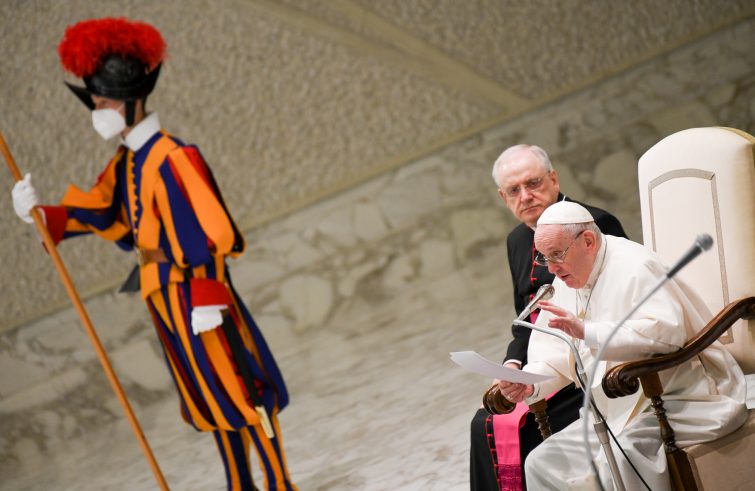
“We cannot avoid death, and precisely for this reason, after having done everything that is humanly possible to cure the sick, it is immoral to engage in futile treatment”, said the Pope in the catechesis of Wednesday’s general audience devoted to Saint Joseph, patron of the good health. In unscripted remarks, Francis mentioned “that phrase of the faithful people of God, of the simple people: ‘Let him die in peace, help him to die in peace’: such wisdom!” Francis then delved into “the quality of death itself, the quality of pain, of suffering.” “We must be grateful for all the help that medicine endeavours to give, so that through so-called ‘palliative care’, every person who is preparing to live the last stretch of their life can do so in the most human way possible.” “However, we must be careful not to confuse this help with unacceptable drifts towards killing”, he pointed out. In his concluding remarks, the Pope made a renewed appeal for peace in Ukraine: “war is madness!”, serious dialogue is what is needed.
“We must accompany people towards death, but not provoke death or facilitate any form of suicide”,
the Holy Father’s guidance: “the right to care and treatment for all must always be prioritised, so that the weakest, particularly the elderly and the sick, are never discarded.”
“Life is a right, not death, which must be welcomed, not administered”, Francis said: “And this ethical principle applies to concerns everyone, not just Christians or believers.”
“Accelerating the death of the elderly is neither human nor Christian” – the inspiration contained in the concluding part of the catechesis, wherein the Pope addressed off text “a real social problem: ‘planning’, accelerating the death of the elderly.” “Very often we see in a certain social class that the elderly, since they do not have means, are given fewer medicines than they need, and this is inhuman. It is neither human nor Christian”, Francis denounced. “They are our wisdom. And if they do not speak, they are still the symbol of human wisdom”, Francis said. “They are those who went before us and have left us so many good things, so many memories, so much wisdom.” “Please, do not isolate the elderly, do not accelerate the death of the elderly”, is the plea of the Pope. “To caress an elderly person has the same hope as caressing a child, because the beginning of life and the end are always a mystery, a mystery that should be respected, accompanied, cared for. Loved.”
“The so-called “feel-good” culture tries to remove the reality of death, but the coronavirus pandemic has brought it back into focus in a dramatic way”,
Francis said after having thanked Pope Benedict XVI, who, at 95, in his letter on cases of sexual abuse committed in the diocese of Munich and Freising, “has the clarity to tell us this: ‘I am before the obscurity of death, at the dark door of death.’ It is good advice that he has given us: to listen to death before the dark door of death”, the Pope said, commending the Pope emeritus. Francis thus spoke of the “terrible” coronavirus pandemic, when “death was everywhere, and so many brothers and sisters lost loved ones without being able to be near them, and this made death even harder to accept and process.” In this respect, Francis praised the gesture of a nurse, who fulfilled the last wish of a grandmother who was dying of Covid: to bid the last farewell to her family. The nurse took out her mobile phone and put her in touch with them: “the tenderness of that farewell.”
“I have never seen a removals van following a hearse”, the Pope said speaking of the loneliness of death: “We will go alone, with nothing in the pockets of our shroud: nothing. Because the shroud has no pockets.”
“It makes no sense to accumulate if one day we will die.” His counsel: “what we must accumulate is love, and the ability to share, the ability not to remain indifferent when faced with the needs of others.” “what is the point of arguing with a brother, with a sister, with a friend, with a relative, or with a brother or sister in faith, if then one day we will die?”, Francis asked: “What point is there in being angry, in getting angry with others? Before death, many issues are brought down to size. It is good to die reconciled, without grudges and without regrets! I would like to say one truth: we are all on our way towards that door, all of us.”









